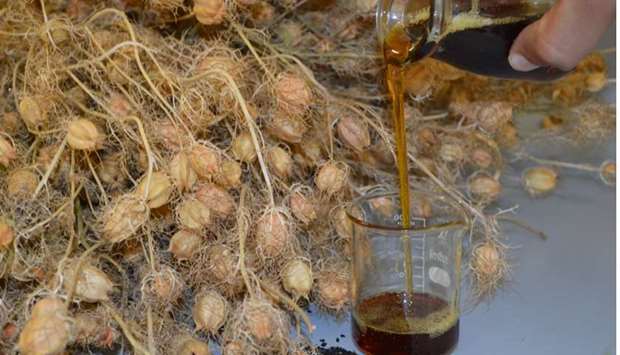Qur’anic Botanic Garden (QBG), a member of Qatar Foundation, hosted a webinar titled ‘Medicinal Plants and their importance to the human immune system’, shedding light on the numerous ways medicinal plants can help boost the immune system.
The discussion was moderated by Ahmed ElGharib, QBG assistant researcher, and featured experts in the field, who discussed the potential uses of medicinal plants in the fight against diseases, exploring case studies on plants, foods and beverages that can be used to strengthen the response of the immune system.
The webinar also included presentations on fungal plants in Qatar, their medical properties, and the state’s role in protecting them, as well as a lecture on medicinal plants and related laboratory experiments analysing their effect on immune diseases and cancer.
The Holy Qur’an and Hadith mention many such plants with medicinal applications, among them nigella sativa (black seed), ginger, fig, grape, garlic, lentil, olive, onion and pomegranate.
Traditional medicine and medicinal plants are increasingly being brought into the spotlight around the world. In fact, in 2004, the World Health Organisation (WHO) released standardised guidelines for good agricultural practices for growing medicinal plants, to ensure that production of herbal medicines is of good quality, safe, sustainable and poses no threat to either people or the environment, signalling the projected increase in importance of this topic.
Dr Ala-Eddin al-Moustafa, professor of cell biology, College of Medicine at Qatar University, and one of the speakers in the webinar, said: "The webinar was an excellent opportunity to share information about medicinal plants and educate the public about the central role that these plants play in laboratory research, the activation of the immune system and helping reduce the growth and spread of certain types of cancers.”
Commenting on the webinar, Fatima al-Khulaifi, director of QBG, said: “Botanical gardens around the world recognise the importance of medicinal plants and their role in the prevention of disease and strengthening the body. Active substances extracted from medicinal plants are
considered vital components of the modern medical industry. Hence, botanical gardens play a significant role by preserving these plants and contributing to research in this field through collaboration with scientific institutions.
"The Arab world, and the Gulf region in particular, has a rich history in the use of traditional medicine, such as the use of senna and myrrh, in parallel with modern medicine.”
The webinar also included presentations on fungal plants in Qatar, their medical properties, and the state’s role in protecting them, as well as a lecture on medicinal plants and related laboratory experiments analysing their effect on immune diseases and cancer.
The Holy Qur’an and Hadith mention many such plants with medicinal applications, among them nigella sativa (black seed), ginger, fig, grape, garlic, lentil, olive, onion and pomegranate.
Traditional medicine and medicinal plants are increasingly being brought into the spotlight around the world. In fact, in 2004, the World Health Organisation (WHO) released standardised guidelines for good agricultural practices for growing medicinal plants, to ensure that production of herbal medicines is of good quality, safe, sustainable and poses no threat to either people or the environment, signalling the projected increase in importance of this topic.
Dr Ala-Eddin al-Moustafa, professor of cell biology, College of Medicine at Qatar University, and one of the speakers in the webinar, said: "The webinar was an excellent opportunity to share information about medicinal plants and educate the public about the central role that these plants play in laboratory research, the activation of the immune system and helping reduce the growth and spread of certain types of cancers.”
Commenting on the webinar, Fatima al-Khulaifi, director of QBG, said: “Botanical gardens around the world recognise the importance of medicinal plants and their role in the prevention of disease and strengthening the body. Active substances extracted from medicinal plants are
considered vital components of the modern medical industry. Hence, botanical gardens play a significant role by preserving these plants and contributing to research in this field through collaboration with scientific institutions.
"The Arab world, and the Gulf region in particular, has a rich history in the use of traditional medicine, such as the use of senna and myrrh, in parallel with modern medicine.”

